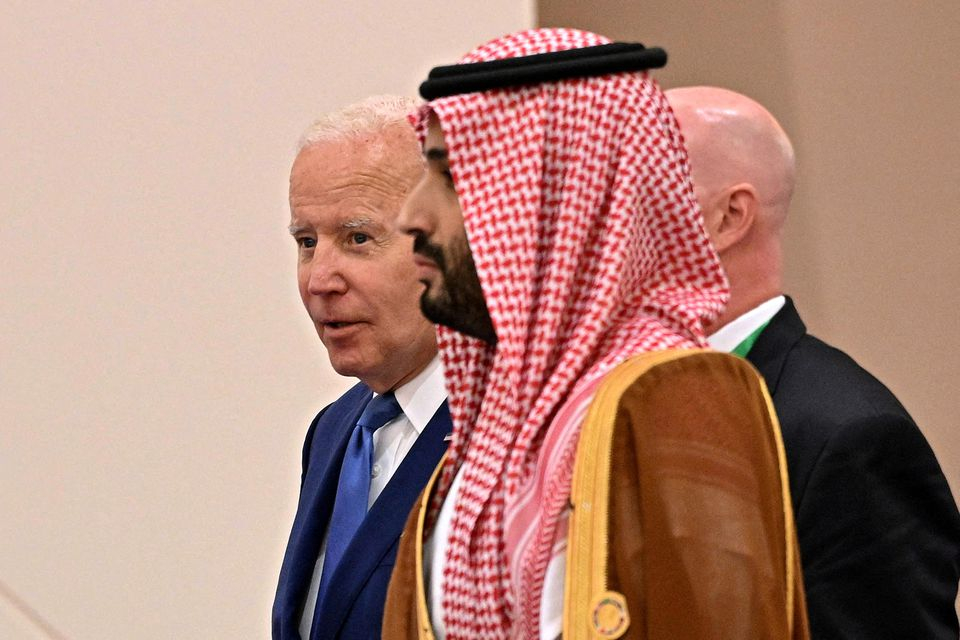By Reuters
The U.S.-Saudi alliance has weathered many storms over the decades, but the relationship remains vital to both: Saudi Arabia is the world's biggest oil exporter and the United States' largest foreign military sales customer.
Here are some milestones in ties:
1931
The United States recognises the Kingdom of Hejaz and Nejd, renamed Saudi Arabia the following year.
1933
Saudi Arabia grants an oil exploration concession to Standard Oil of California. Its Saudi branch, later renamed Aramco, makes the first commercial find in 1938.
1945
President Franklin D. Roosevelt meets King Abdulaziz aboard the USS Quincy in the Suez Canal, setting the stage for decades of close ties.
1950
Saudi Arabia renegotiates the Aramco concession, securing more revenue.
1951
Saudi Arabia and the United States conclude a Mutual Defense Assistance Agreement, opening the way for U.S. arms sales.
1973
Saudi Arabia joins an Arab oil embargo against the United States and other countries over their support for Israel in a 1973 war with Egypt and Syria. Oil prices had nearly quadrupled by the time the embargo was lifted in 1974.
1979
With U.S. and Pakistani cooperation, Saudi Arabia helps fund Afghan resistance to Soviet occupation. Many Saudis, including Saudi-born Osama bin Laden, fund and join Afghan fighters.
1980
Saudi Arabia completes purchase of 100% of Aramco shares.
1990
Iraq invades Kuwait. The following year, U.S.-led forces use Saudi Arabia as a launchpad to expel Iraqi forces. Most U.S. troops then leave Saudi Arabia, but thousands remain.
1996
A truck bomb kills 19 U.S. soldiers at a U.S. military complex in Khobar.
Bin Laden declares jihad against Americans he says are occupying Saudi Arabia.
2001
Nearly 3,000 people are killed in the Sept. 11 attacks by al Qaeda hijackers. Fifteen of the 19 hijackers are Saudis.
Saudi Arabia always denies any link to or knowledge of the attacks. A U.S. government commission in 2004 finds no evidence that Saudi Arabia directly funded al Qaeda. It leaves open whether individual Saudi officials might have done so.
2003
Saudi Arabia opposes the U.S.-led invasion of Iraq.
The United States withdraws all remaining combat troops from Saudi Arabia.
Three suicide bombers kill at least 35 people, including nine Americans, in Riyadh, part of a years-long militant insurgency against foreigners and Saudi government facilities.
2011
The Arab world is convulsed by uprisings. Saudi Arabia is concerned by what it sees as President Barack Obama's abandonment of Egyptian President Hosni Mubarak, a U.S. ally.
2013
Saudi royals complain publicly about U.S. policies, including Obama's approach to Iran and Syria.
2015
World powers strike a deal with Iran easing sanctions in return for curbs on its nuclear programme. Riyadh fears this will strengthen Iran.
Saudi Arabia launches a campaign against Iran-aligned Houthis in Yemen, giving Washington only a few hours' notice. The United States however provides military support.
2016
Congress overrides Obama's veto of a law removing sovereign immunity and opening the way for relatives of Sept. 11 victims to sue Saudi Arabia over the attacks.
2018
Saudi Arabia welcomes President Donald Trump's decision to withdraw from the Iran agreement.
In November, the United States condemns Khashoggi's killing at the Saudi consulate in Istanbul.
The United States becomes the world's largest oil producer.
2019
U.S. lawmakers, citing evidence of Saudi Crown Prince Mohammed bin Salman's (MbS) role in the Khashoggi case and incensed over the civilian toll from Saudi air attacks in Yemen, increase efforts to block arms sales to Riyadh. Riyadh blames the killing on rogue operatives, denying MbS had any role.
An attack on Saudi oil installations halves production. Trump says it looked like Iran was behind the attack but stresses he does not want to go to war.
2020
Saudi Arabia signals backing for the Abraham Accords under which its allies the United Arab Emirates and Bahrain forge ties with Israel. Riyadh stops short of recognising Israel itself.
2021
President Joe Biden adopts a tougher stance over Saudi Arabia's rights record. As a presidential candidate, Biden had vowed to make Riyadh a "pariah" over the Khashoggi killing.
Biden declares a halt to U.S. support for offensive operations in Yemen, including relevant arms sales.
2022
In June, Biden says Saudi Arabia had shown "courageous leadership" by backing extension of a U.N.-backed Yemen truce.
With oil prices soaring, the White House welcomes a decision by OPEC+ nations to increase output.
Biden visits Saudi Arabia in a bid to reset ties, but leaves without securing an immediate pledge for more oil supplies.
OPEC+ agrees to cut oil output targets ahead of U.S. mid-term elections, leading Biden to pledge "consequences" for Saudi Arabia and accusing it of siding with Moscow.
The White House welcomes moves by Riyadh to help Ukraine in its war with Russia, and later reiterates its commitment to the kingdom's security.
The Biden administration rules that MbS, as Saudi prime minister, has immunity from a lawsuit over Khashoggi's murder.

















